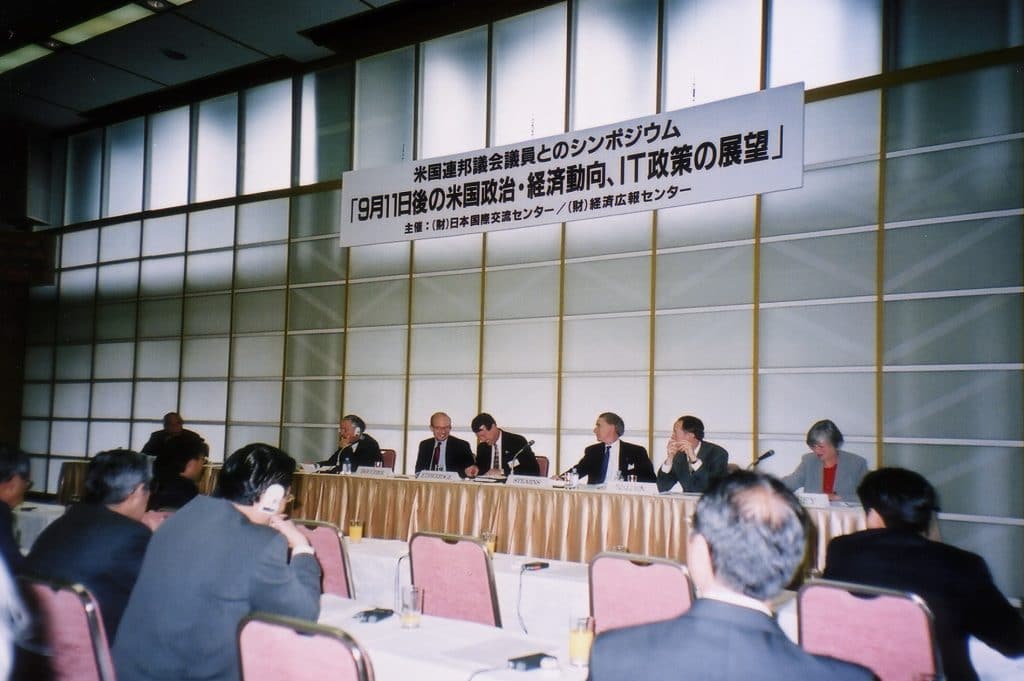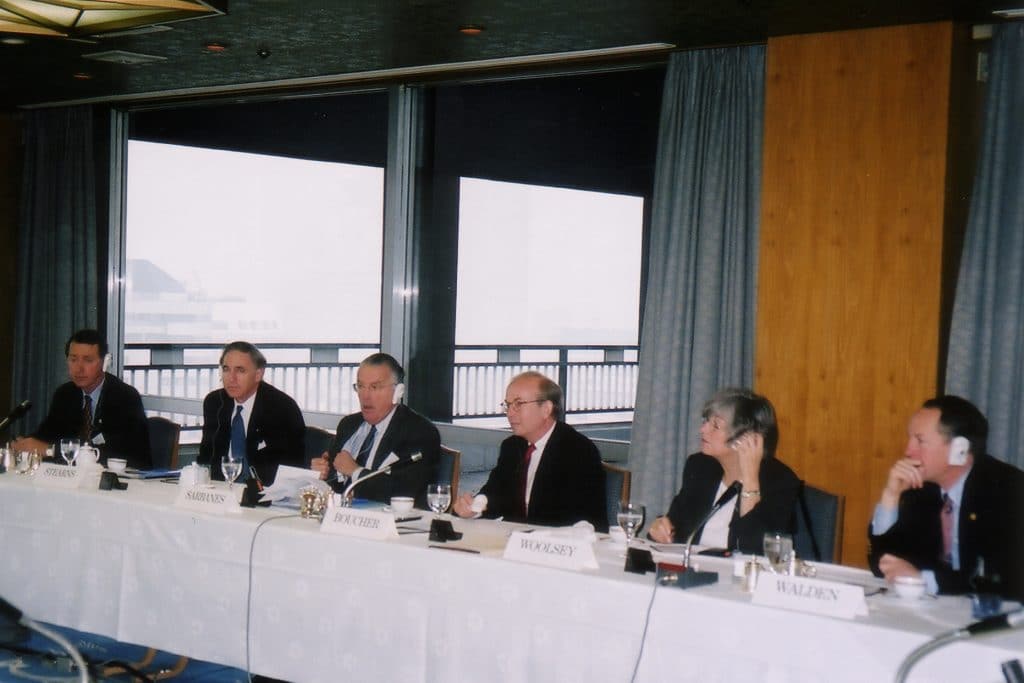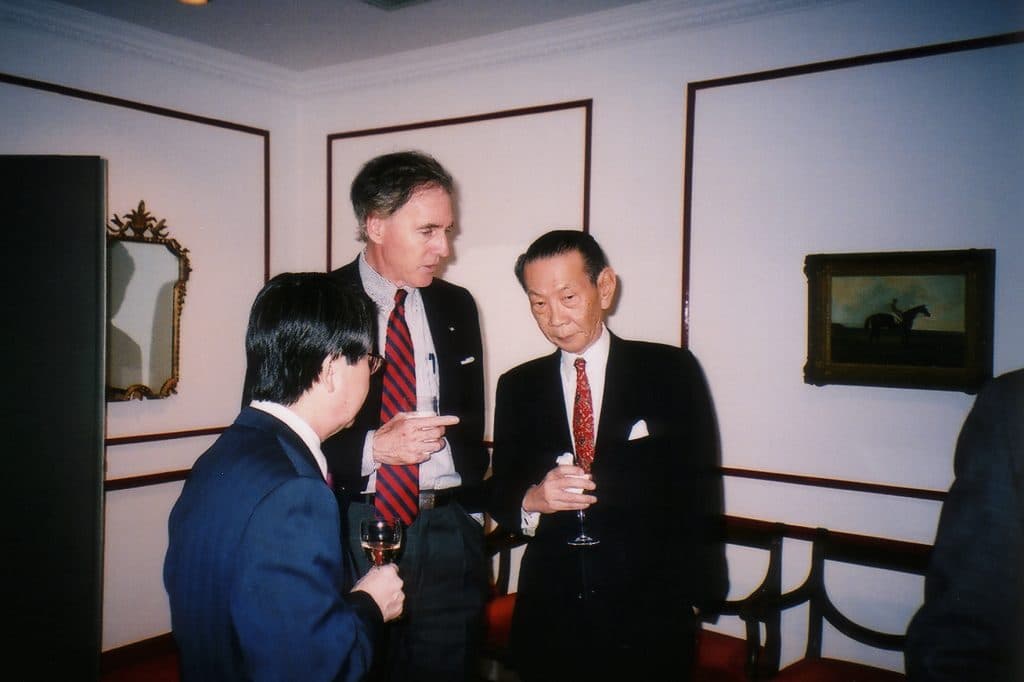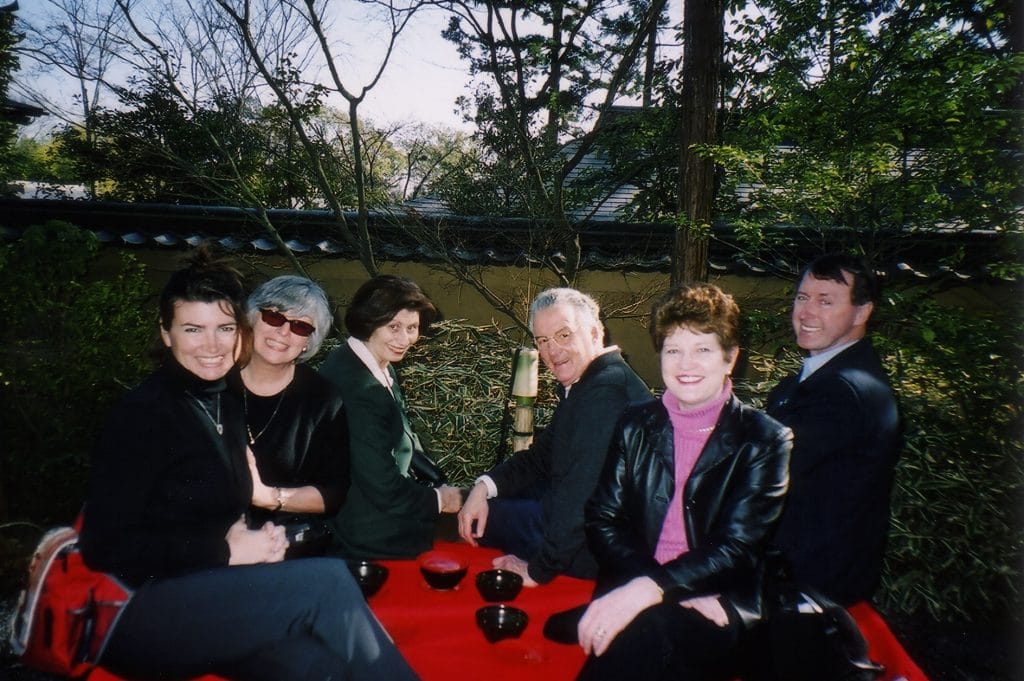The six members of the 25th US Congressional Delegation visited Japan from March 24 to March 30, 2002, as part of the US-Japan Parliamentary Exchange program. The group exchanged views with over 30 Diet members, including the top leaders of the three largest political parties—Taku Yamasaki (secretary-general of the Liberal Democratic Party), Naoto Kan (secretary-general of the Democratic Party of Japan), and Tetsuzo Fuyushiba (secretary-general of the New Komeito)—as well as former Prime Minister Tsutomu Hata, US Ambassador Howard Baker, Foreign Minister Yoriko Kawaguchi, and high-ranking Ministry of Foreign Affairs officials, who spoke with the delegation about Japan’s foreign policy, US-Japan relations, and regional security issues.
In addition, Economy Minister Heizo Takenaka, senior Ministry of Economy and Trade (METI) officials, and several Japanese corporate leaders and entrepreneurs met with the delegates to discuss Japan’s economic outlook and IT-related issues. One of the high points of the program was a public symposium, co-sponsored by the Keizai Koho Center, where the delegates shared their views with an audience of almost 200 opinion leaders in a lively panel discussion on “Political and Economic Developments in the United States after September 11.”




Participants
House of Representatives
RICK BOUCHER, D-Virginia
BOB ETHERIDGE, D-North Carolina
CLIFF STEARNS, R-Florida
GREG WALDEN, R-Oregon
LYNN WOOLSEY, D-California
Senate
PAUL SARBANES, D-Maryland
Overview
Six members of Congress participating in the 25th US Congressional Delegation visited Japan from March 24 to March 30, 2002 for a series of meetings with the top leadership of Japan’s major political parties, cabinet ministers, senior government officials, and influential business leaders. In addition to speaking with the country’s senior leadership, they also met with representatives of Japan’s emerging generation of leaders, engaging in several roundtable discussions with young business and political leaders about the future of Japan’s economy, politics, and society, the US-Japan relationship, and both countries’ evolving role in Asia. The delegation was one of the largest in recent years and included three participants who were on their first Congressional trip to Japan.
Program Background
The delegation was organized as part of the US-Japan Parliamentary Exchange Program, which was established in 1968 to promote closer working relations and enhance understanding between members of the US Congress and the Japanese Diet. Over 200 members of the Senate and the House have participated in the program in Japan, and approximately 160 Diet members have visited the United States under its auspices. This nonpartisan program—the longest-running nongovernmental exchange program between members of the US Congress and the Japanese Diet—affords leaders from both countries, who may otherwise never meet, the opportunity to discuss issues of mutual concern in the US-Japan relationship, particularly on topics related to security, trade, and common global challenges.
This program, which will be followed by a visit of Diet Members to the United States later in the year, has been made possible by a generous grant from the Freeman Foundation as well as financial support from a number of corporate sponsors. This support has been critical in sustaining the US-Japan Parliamentary Exchange Program as an independent nonpartisan and nongovernmental exchange program over the past 34 years. As the role of legislators in the policy process grows, particularly in Japan, exchange programs of this sort should serve an even greater role in maintaining and further strengthening the relationship between the United States and Japan.
Program Summary
The 2002 delegation’s visit came as Prime Minister Junichiro Koizumi faced declining public support and as a series of political scandals eroded hopes that Koizumi and other reformers in the Diet could swiftly implement structural economic reforms and restore the public’s faith in government. It also took place as the United States and its allies reached an inflection point in the “war against terrorism.” Directly following September 11, the United States received widespread international backing for military action in Afghanistan, and Japan in particular showed its support for the US effort with the extraordinarily rapid passage of the Anti-terrorism Special Measures Law that, for the first time, allowed the Self-Defense Forces to provide rear area support for the United States in a war zone. However, as the initial military response in Afghanistan has drawn to a close, the United States and its allies face with the potentially explosive question of what should be the next step in the global campaign.
A large number of political, diplomatic, and business leaders graciously agreed to meet with the delegation to discuss these topics and many more. During the course of their meetings and seminars, the delegation had the opportunity to exchange views with over thirty Diet members. These included the top leaders of the three largest political parties—Taku Yamasaki, Secretary-General of the Liberal Democratic Party (LDP); Naoto Kan, Secretary-General of the Democratic Party of Japan (DPJ); and Tetsuzo Fuyushiba, Secretary-General of the New Komeito—as well as former Prime Minister Tsutomu Hata. Foreign Minister Yoriko Kawaguchi, US Ambassador Howard Baker, and high-ranking Ministry of Foreign Affairs officials spoke with the delegation about Japan’s foreign policy and US-Japan relations. Meanwhile, Economy Minister Heizo Takenaka, senior Ministry of Economy and Trade (METI) officials, and Japanese corporate leaders, including Mitsubishi Chairman Minoru Makihara, Sony CEO Kunitake Ando, and NTT DoCoMo President Keiji Tachikawa, met with the delegates to discuss Japan’s economic outlook and IT-related issues.
The participants also held talks with a diverse selection of Japan’s emerging leaders. A roundtable discussion with over a dozen up-and-coming Diet members was organized so they could speak about new challenges in US-Japan security relations in the wake of the September 11 attacks. The Congressional members and the Diet members took advantage of this opportunity and engaged in a lively debate with each other and amongst themselves about the future of the US-Japan alliance, each country’s appropriate role in Northeast Asia, and potential areas of cooperation. In addition, the delegation members—many of whom had a special interest in IT-related issues—spoke with a separate set of young Diet members about IT policy and met with Internet entrepreneurs such as Oki Matsumoto, President and CEO of Monex, and Jyoichi Ito, President and CEO of Neoteny, to discuss the challenges and opportunities facing the IT sector, both in Japan and globally.
 One of the high points of the program was a public symposium that was co-sponsored by the Keizai Koho Center where the delegates shared their views with Japanese leaders and opinion-makers regarding US economic policy, US-Japan relations, and the domestic political dynamics shaping US foreign policy. This lively panel discussion drew almost 200 Diet members and staffers, journalists, business executives, and NGO leaders, and allowed the Congressional members to engage in a free exchange of opinions with the audience.
One of the high points of the program was a public symposium that was co-sponsored by the Keizai Koho Center where the delegates shared their views with Japanese leaders and opinion-makers regarding US economic policy, US-Japan relations, and the domestic political dynamics shaping US foreign policy. This lively panel discussion drew almost 200 Diet members and staffers, journalists, business executives, and NGO leaders, and allowed the Congressional members to engage in a free exchange of opinions with the audience.
Participants’ Reflections
Numerous delegates echoed the views of many of the experts they met who argued that there has to be fundamental political change in Japan. They seemed dismayed at the frequency of political scandal—in the two weeks immediately preceding and during their stay in Japan three major political figures were forced to resign from their parties or from the Diet—and they questioned why the opposition parties had so far failed to capitalize on the public’s deep dissatisfaction with the ruling LDP. The potential for a split in the LDP and a wholesale realignment of the party system was raised repeatedly and several of the analysts that the delegates met predicted that a breakup of the party is increasingly likely over the next few years.
Despite the deep woes of the political system, the delegates were encouraged by the younger generation of political and business leaders. They were impressed by the forthrightness and dynamism of the young IT executives with whom they spoke as well as by the deep understanding of policy issues displayed by many of the young politicians. Their firsthand experiences with these young leaders seemed to confirm the claims they heard from analysts about the massive social changes underway below the surface of Japanese society and led several of the participants to concur that, while the short-term political and economic outlook for Japan may be bleak, there is significant potential for a brighter long-term future.
Since several of the delegates specialize in IT policy, they were particularly interested in speaking about specific IT-related issues in theUS-Japan relationship. They exchanged views on a wide variety of highly technical issues with bureaucrats and politicians with expertise in IT and came to the conclusion that there is a great deal of room for genuine bipartisan and binational cooperation between US and Japanese legislators regarding the development of the Internet and the IT sector. Several of the Congressional members and Diet members floated the idea of setting up a recurring dialogue on these topics, possibly through parliamentary delegations that specialize in IT-related issues.
Foreign policy and security policy also comprised an important component of their discussions, and the delegation members began many of their meetings by expressing their gratitude to Japanese leaders for the support Japan has shown for the United States since September 11. They stressed the importance of continued international cooperation in formulating a response to global terrorism, but made it clear that the United States feels obligated to and justified in using military force to ensure its security in the increasingly threatening world of the 21st century. While acknowledging their support for the US military effort in Afghanistan, the Japanese foreign policymakers who spoke with the group expressed their deep concern over the extension of the military campaign to Iraq. Such a move, they felt, would find little support in Japan and throughout the rest of the world, plus it would inflame tensions in the Middle East, so they counseled prudence. They also spoke about the need for the United States to balance its “hard” military response with “softer” actions such as increased foreign aid and more multilateral diplomacy. While the delegates and the Japanese policymakers with whom they met sometimes held differing views on the appropriate direction of US foreign policy after September 11, both sides agreed that their exchanges of opinions proved extremely useful in improving their understanding of the intentions and concerns of each country’s leadership.
The discussion of security policy extended far beyond the implications of the September 11 attacks. The delegation members spent a great deal of time exchanging views on Northeast Asia security issues with a wide variety of Japanese political leaders, discussing US and Japanese relations with China, continuing difficulties in North Korea relations, and the stability of the US-Japan Security Alliance. Both Japanese and US leaders agreed that their relationship with China has become increasingly critical, yet more complex than ever because China has the potential to be, simultaneously, the source of enormous dynamism, instability, and economic competition for the United States and Japan. Meanwhile, some of the younger Japanese politicians warned the delegates that the support of the younger generation for US military bases in Japan was significantly lower than in the past and that the deep appreciation of the importance of the US-Japan relationship that can be found among the older generation in Japan seems to be lacking among younger people. Their criticisms of US basing practices were met with a warning by the Congressional members that US support for military bases in Japan is, indeed, more fragile than widely realized and that calls for a US withdrawal of forces intended narrowly to garner domestic political support may actually lead to a US pullout, striking a great blow to both country’s security interests. After trading views on the future of the US-Japan alliance, the delegation members and their counterparts in the Diet agreed that their discussions clearly demonstrated the value of frequent frank and informal exchanges of opinions between legislators in both countries.



